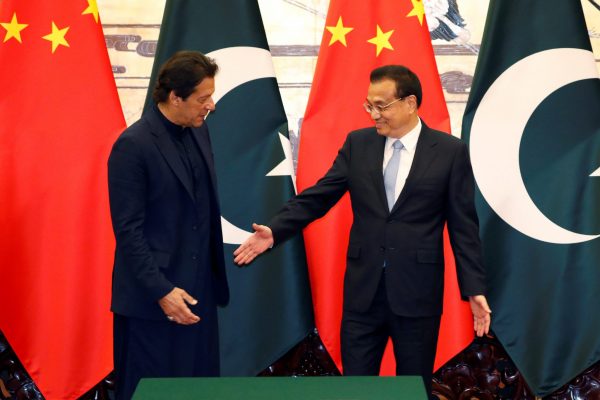Pakistan is facing myriad internal and external challenges in three key areas — economic, diplomatic and strategic. In facing these challenges, Pakistan often turns to its traditional sources of support — Muslim countries, especially the wealthy Arab states, China and the United States. In addition to this, the IMF and the World Bank have also provided bailout packages on different occasions. The role of these countries is limited to one area or the other. But it is only China which can address Pakistan’s needs in all three areas.
The help Islamabad receives from Arab countries is largely confined to the economic domain. The current Imran Khan administration, like its predecessors, received oil on deferred payments, economic bailouts and cash from some Middle Eastern states. In addition, Pakistani expatriates in the Middle East send remittances that play a crucial role in Pakistan’s balance of payments.
But these Muslim countries lack diplomatic clout, not to mention military power and technology. On the Kashmir issue, the Muslim countries merely provided verbal support — and reluctantly. Adding to the current India–Pakistan tensions, Pakistan faced an embarrassing situation when it was lobbying against India’s alleged human rights violations in Kashmir while the UAE and Bahrain honoured Indian Prime Minister Narendra Modi with the highest civilian awards. Of the Muslim countries, only Turkey, Malaysia and to some extent Iran provided some support to Pakistan. The statement from the Organization of the Islamic Conference has no practical utility.
In strategic terms, none of the Muslim states have any significant impact. Most of the Arab world, despite oil wealth, are dependent on the West for their own defence. Some of them even seek Pakistan’s help for defence purposes.
The US has also proved to be a source of (political) economic and military assistance to Pakistan. However, the ebb and flow of US–Pakistan relations determines the level of such support. In the past, the United States made notable diplomatic efforts to settle the Kashmir issue and provided state-of-the-art military weapons and considerable economic assistance under the alliance relationship with Pakistan, especially during the Cold War.
The US support largely depended on Washington’s strategic interests in the region, which inevitably changed over time. Regarding the current India–Pakistan tensions over Kashmir, US President Donald Trump offered to mediate between Pakistan and India, but changed his position soon after. After a meeting with Modi, in which the latter rejected any scope for third party mediation, Trump stated that India and Pakistan could resolve the dispute by themselves.
US–Pakistan relations do appear to be thawing, but it seems to be a reward for Pakistan’s role in the Afghan peace process by pushing the Taliban to the negotiation table, rather than a recognition of Pakistan’s strategic role in South Asia. Most sources of political, economic and strategic support for Pakistan is limited and subject to other factors — they are far from enduring.
China seems to be the only country that has both the capability and willingness to support Pakistan economically, diplomatically and strategically. Beijing has proved this in past and in recent crises. China was among the countries that provided economic assistance to Imran Khan’s government when foreign exchange reserves had reached a record low. Although China’s economic assistance was not a free lunch, nor was it excessive, Beijing stood there to prevent Islamabad from defaulting.
On India’s recent move in Kashmir, China condemned Indian ‘unilateral’ action and warned of ‘grave consequences’. China’s Ministry of Foreign Affairs stated, ‘The recent unilateral revision of domestic laws by the Indian side continues to undermine China’s territorial sovereignty, which is unacceptable and will not have any effect’.
China fully supported Pakistan in approaching the UN Security Council (UNSC) over the issue. After the UNSC session, Chinese UN representative Zhang Jun stated that India’s move challenged China’s ‘sovereign interests’ and violated a bilateral agreement related to peace in the border area. Zhang emphasised that the action would not change China’s ‘exercise of sovereignty and effective administrative jurisdiction’ over Aksai Chin, a disputed territory in Jammu and Kashmir. Although the UNSC session could not issue a joint statement, Pakistan could not have taken the issue to the world body without China’s support.
Zooming in on the recent crises, China’s position against India’s revocation of Article 370 was closer to Pakistan’s own stance than any other country in the world. Although China’s position stemmed from its own security concerns, its support proved valuable to Pakistan. On the whole, Beijing’s support to Pakistan in the economic, diplomatic and strategic fronts are key factors behind its dependence on China. As the Kashmir issue is unlikely to be resolved anytime soon, additional strategic consultation between Beijing and Islamabad is to be expected.
Dr Ghulam Ali is Associate Professor at the Department of Political Science, School of Marxism, Sichuan University of Science & Engineering.

